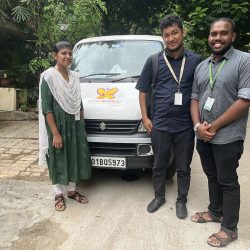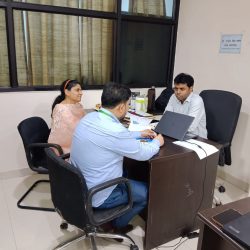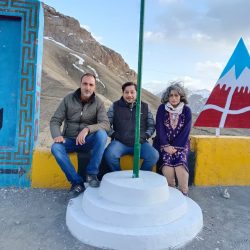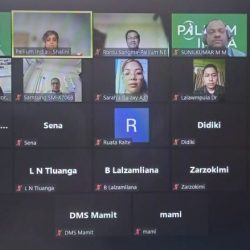February 2014
NDPS Act Amendment – The Long Journey
As most of you are aware, India’s draconian Narcotics and Psychotropic Substances(NDPS) Act has been amended; the Amendment Bill that was passed by our Parliament on 21 February 2014 is intended to simplify access to medicines for patients in pain.
The NDPS Act came into existence in 1985, intended mainly to curb abuse. However the clauses set in the NDPS Act led to a drastic reduction in availability of medicines to people who needed relief from pain and suffering. The Amendment Bill ensures that while preventing abuse is crucial, there is no unnecessary delay or restriction in availability of medicines for the needy. This is a huge step forward in our efforts to bring dignity and quality to the life of suffering patients.
Palliative care professionals across the country – nay, the world – had been trying very hard to get the Amendment Bill passed in the three sessions of the Parliament in 2013. When the efforts of all the palliative care fraternity during the budget and monsoon sessions failed to get the Parliament to consider this bill failed, Narottam Sekhsaria Foundation (NSF) came to our rescue. With their help, we got the public relations firm Edelman to support us. Though we came close in the winter session, the short session ended before the Bill was taken up. The likelihood of the Bill being considered in the extended session of the Parliament in February was very low. However, we were prepared to put forth our best efforts.
Finally, on the last-but-one day, Lok Sabha passed the amendment. It was still necessary for Rajya Sabha also to pass it, and there was just one day left. NDPS amendment was not listed in the business for that day, but finally, it did manage to get into a supplementary list. Throughout the duration of the session on that day, Mr Amandeep Singh from Edelman was in Lok Sabha, constantly garnering support for the cause. The whole palliative care community of India joined hands to contact whoever they could. It was heartening to see so many people coming forward to offer support from all walks of life; it showed us once again how important the Amendment was, to everyone who knew and cared about the suffering of others.
When hope began to wear thin, on the last day of the Parliament, the 21st of February 2014, the Rajya Sabha passed the NDPS Amendment Bill, as the last item on the agenda at around 5.30 PM.
It will now be law, once the President has signed it.
There are many people to thank – too numerous to name. However we must make a mention of:
- David Joranson & PPSG,
- Tripti Tandon & Lawyers’ Collective and
- Rajesh Nandan Srivastava, the director of narcotics.
THANK YOU, everyone who lent a hand.
–
Media Support for NDPS
 There had been an overwhelming support from the media throughout our struggle to get the Amendment Bill passed. We learned an important lesson – that advocacy is vital to get any important thing done.
There had been an overwhelming support from the media throughout our struggle to get the Amendment Bill passed. We learned an important lesson – that advocacy is vital to get any important thing done.
Here are some of the articles and news items from different sources across the world.
- MR Rajagopal: The man who spearheaded efforts to improve access to morphine, Economic Times
- The Hindu on NDPS Amendment
- CNN-IBN on NDPS Amendment
- Times of India on NDPS Amendment
- Ms Harmala Gupta’s article in Times of India
- Dr Taranjit Singh writes in the Hindustan Times
–
Information on NDPS Amendment
Several people have been asking us for a copy of the NDPS amended Act. Unfortunately it is not a document in public domain yet. Once the President signs it, it will be.
For the time being, we are happy to give you more information about the NDPS amendment. Please see:
–
Morphine Consumption in India
With respect to the morphine consumption in India, while the good news is that it is on the rise, the bad news is that the progress is too slow. The image indicates the quantity of morphine sent out from the Government Opium and Alkaloid Factory to manufacturers in India, every year. The last few years seem to be representative of increasing morphine consumption in the country.

Of course, the quantity reported here is inaccurate in itself, in several ways. For example, you will notice in the graph a couple of peaks. The peak in the year 2000 was simply because the Government of India had bought huge quantities and supplied it free to cancer centres around the country. Most of this was never used and was burnt. In 2004, 2005 and 2006, there were major gaps in production and supply in the Government Opium and Alkaloid Factory and that resulted in an unnatural hike in the subsequent year. Well, at least the data in the last few years seem to be representative of increasing morphine consumption in the country.
We wish the graph was steeper, though.
–
Congratulations Anne
 Dr Anne Merriman, the founder of Hospice Africa-Uganda (HAU) has been nominated for Nobel Peace Prize. In the picture, you see her on the cover of her own book, “Audacity to Love”.
Dr Anne Merriman, the founder of Hospice Africa-Uganda (HAU) has been nominated for Nobel Peace Prize. In the picture, you see her on the cover of her own book, “Audacity to Love”.
Dear Anne,
Every one of us at Pallium India is jubilant over this news. What you did for the people of Sub-Saharan Africa was nothing short of a miracle. It was simply pure love in action. You showed us all how to innovate and to create solutions (like your oral morphine solution) where none seemed possible. You inspired people all over the world.Congratulations Anne, and thank you for all you did.
–
Annual Conference of the Indian Association of Palliative Care: A Satisfying Experience

This year, the annual conference of the Indian Association of Palliative Care (IAPC) was held at Bhubaneswar, Orissa. IAPC Conferences have always been influential in development of palliative care in the country, permitting exchange of information and learning. This is the one time in the year when most people in the field get together.
The talk by Dr Nandini Vallath, Pallium India’s consultant, on the history of opium and the NDPS Act in the country, stood out in originality of contents.
The debate on “Is palliative medicine a threat to the corporate world of medicine and specialist physician?” was again exciting and much appreciated. You can read about it on ehospice.
Congratulations to Dr Sukdev Nayak and the rest of the organizing team.
–
Dr Priya Kulkarni takes over as Chief Functionary of Indian Association of Palliative Care
 On the 15th of February, 2014, at the Annual Conference of the Indian Association of Palliative Care (IAPC), Dr. Priya Kulkarni, Medical Director of Cipla Palliative Care Centre, Pune, was appointed as the new Secretary. Dr. Priya brings with her a wealth of experience, sincerity and integrity.
On the 15th of February, 2014, at the Annual Conference of the Indian Association of Palliative Care (IAPC), Dr. Priya Kulkarni, Medical Director of Cipla Palliative Care Centre, Pune, was appointed as the new Secretary. Dr. Priya brings with her a wealth of experience, sincerity and integrity.
Welcome, Dr. Priya Kulkarni, and all the best! We are with you.
–
Welcome to Kerala, Penny and Jeremy
Dr Jeremy Johnson, palliative care consultant from the UK, takes over as Medical Director of Alpha Palliative Care in Edamuttam, Thrissur District, Kerala. Jeremy will be accompanied by his wife, Mrs Penny Johnson, who is also a palliative care professional.
Dear Penny and Jeremy, welcome to the palliative care scene in Kerala. Alpha is lucky to have your service.
–
Pallium India is star-struck!

Famous star of Malayalam screen Sri Suresh Gopi dedicated Pallium India’s inpatient facility to the public.on 11th february 2014.He spent time interacting patients and families and listened to the song that Pallium India’s patient Lija sang for him. He also received on Pallium India’s behalf, a donation of Rs.1 lakh from Justice M.R.Hariharan Nair.
Dr M.V.Pillai, Dr N N Murali, Mrs and Col Anand ,Mrs and Dr P K Sukumaran Nair and Mrs and Dr Chandrasegharan Nair were other dignitaries who graced the occasion.
Thank you, Mr Suresh Gopi.
–
Congratulations, Dr Sushma Bhatnagar
 This year’s recipient of the annual palliative care award of the Cancer Aid Society is Dr Sushma Bhatnagar, head of Palliative Medicine at AIIMS, New Delhi. A live wire in the palliative care field, she is the editor of the prestigious Indian Journal of Palliative Care. At Bhubaneswar, she was the chairman of the scientific committee. This is the fourth time the responsibility of conducting the scientific program fell upon her.She received the award at the inaugural function of the conference at Bhubaneswar on 14 February 2014.
This year’s recipient of the annual palliative care award of the Cancer Aid Society is Dr Sushma Bhatnagar, head of Palliative Medicine at AIIMS, New Delhi. A live wire in the palliative care field, she is the editor of the prestigious Indian Journal of Palliative Care. At Bhubaneswar, she was the chairman of the scientific committee. This is the fourth time the responsibility of conducting the scientific program fell upon her.She received the award at the inaugural function of the conference at Bhubaneswar on 14 February 2014.
Congratulations, Dr Sushma Bhatnagar.
–
Bruce Davis Award to Dr Anju Mary John

During the inauguration of the 21st annual conference of the Indian Association of Palliative Care at Bhubaneswar on 14 February 3014, Dr Anju Mary John received the coveted Bruce Davis Award from Professor A.K. Mohapatra, director of AIIMS, Bhubaneswar.
Congratulations, Dr Anju.
–
Pediatric Palliative Care Conference
The first pediatric palliative care conference in India was conducted in Mumbai at Tata Memorial Cancer Centre, Mumbai from 10th to 12th of February 2014. Visit ehospice
Inaugurated by Maharashtra’s chief minister Shri Suresh Shetty, the conference was very well-received. The participants had the pleasure of welcoming Bollywood star Kunal Kapoor who dropped in to say Hello to delegates and to offer his support.
Hearty congratulations, Dr Maryanne Muckaden and team.
–
Pallium India-USA Volunteers Complete Stanford Mini-Fellowship

Volunteers from Pallium India-USA recently took part in a training to help them better serve the members of the community: Stanford University School of Medicine’s Successful Aging Mini-Fellowship Program. They joined together for a graduation ceremony at the James H. Clark Center on Stanford campus on November 21, 2013.
“This was an exemplary display of talent, skill and enthusiasm by our team members, and it demonstrated that much can be achieved by joint effort to serve the needs of our aging Indian community in a culturally sensitive manner,” said Pallium India-USA Founder and President Dr. Jerina Kapoor. “Thank you Dr. Periyakoil for inviting us. We learned a lot and hope to connect with our community with this knowledge.”
Congratulations to the 32 Pallium India-USA members receiving their Mini-Fellowship!
Click HERE to view an album of the photos taken at the event.
–
Taking Essential Pain Management (EPM) to the Community
 A one day workshop was held at the Sarada Homoeopathic Medical College, Kulasekaram, co-sponsored by the Faculty of Pain Medicine, College of Anaesthetists , Australia and New Zealand, Pallium Kulasekharam, Kanyakumari District, Tamil Nadu and Pallium India. The scientific course was run by Dr Ramesh Menon, an Anaesthetist and Palliative Care advocate from NZ, helped ably by Dr. Suresh Kumar from Mavelikkara and Pallium India’s Babu Abraham.
A one day workshop was held at the Sarada Homoeopathic Medical College, Kulasekaram, co-sponsored by the Faculty of Pain Medicine, College of Anaesthetists , Australia and New Zealand, Pallium Kulasekharam, Kanyakumari District, Tamil Nadu and Pallium India. The scientific course was run by Dr Ramesh Menon, an Anaesthetist and Palliative Care advocate from NZ, helped ably by Dr. Suresh Kumar from Mavelikkara and Pallium India’s Babu Abraham.
The attendees included volunteers from the Palliative Care unit at Kulasekaram, Homoeo doctors and nurses, healthcare volunteers from the region, a few medical students and nurses from Trivandrum, around 35 in all. It was an all-day event with interactive learning. The Feedback was overwhelmingly positive and the “Recognise-Assess-Treat” message was repeated by all! Hats off to the whole team.
Hats off to the whole team. Look out for the pictures on our Facebook site.
–
Advertisement for experienced palliative care physician

Dr Lindsay Crack who is volunteering for Cankids writes:
Cankids India is looking for an experienced palliative care physician to take the lead to develop multidisciplinary palliative care for children, initially at its 10 bedded facility, DCTH in Delhi and then to replicate the model in other centers across India.
The post holder will recruit and train and manage additional medical, nursing and multidisciplinary staff to deliver high quality palliative inpatient, outpatient and day care services at the center in Delhi and will work closely with colleagues at local cancer centers to increase the awareness, understanding and availability pediatric palliative care.
You will require a minimum of three years’ experience in palliative and pediatric care, and an interest and willingness to work with and support children and their families from diagnosis, through treatment and on into survivorship or bereavement. You will need to be an enthusiastic educator willing to travel across India as the medical ambassador, developing services and participating in regular audit and research.
Please contact Dr Lindsay Crack (mob 9711130747, email:lindsaycrack@cankidsindia.org) for further information or to arrange a visit to our DCTH in Delhi
–
Joan Marston visits Pallium India
 Ms Joan Marston, the pediatric palliative care person of the world who heads the International Children’s Palliative Care Network visited Pallium India in Trivandrum. She went on home visits with our team and also spent time in the Children’s palliative care clinic in which Pallium India collaborates with the departments of Pediatrics and Pediatric Neurology in the Government S.A.T Hospital which is part of Trivandrum Medical College. We are pleased to have her appreciation for what we do for children mostly with neurological disorders.
Ms Joan Marston, the pediatric palliative care person of the world who heads the International Children’s Palliative Care Network visited Pallium India in Trivandrum. She went on home visits with our team and also spent time in the Children’s palliative care clinic in which Pallium India collaborates with the departments of Pediatrics and Pediatric Neurology in the Government S.A.T Hospital which is part of Trivandrum Medical College. We are pleased to have her appreciation for what we do for children mostly with neurological disorders.
–
Support, don’t punish: Katherine Pettus
 Pallium India was very pleased to have with us Ms Katherine Pettus who is part of the International Association for Hospice and Palliative Care and is doing cardinal work in advocacy with the United Nation’s “Commission on Narcotic Drugs”.
Pallium India was very pleased to have with us Ms Katherine Pettus who is part of the International Association for Hospice and Palliative Care and is doing cardinal work in advocacy with the United Nation’s “Commission on Narcotic Drugs”.
Katherine gave a talk to the faculty and post-graduate students at Kerala University’s Department of Law on the International situation regarding access to opioid drugs. The audience interaction was stimulating. The success of her talk was obvious; we have got an invitation from the department for more work together regarding palliative care.
Thank you Katherine for the visit and for your precious work
–
Resources related to palliative care in Breast Cancer
In connection with World Cancer Day, Breast Health Global Initiative (BHGI) writes to inform us about three open access resources:
- Supportive care during treatment for breast cancer
- Supportive care after curative treatment for breast cancer (survivorship care)
- Supportive and palliative care for metastatic breast cancer
–
The Lancet on the WHO resolution
Mr Diederik Lohman of Human Rights Watch writes:
The Lancet just published a great editorial, calling for a global campaign on palliative care. References the WHO/WPCA Atlas.
Lancet Oncology also published the below short piece on the EB resolution:
Thank you very much Diederik, from all of us. We are full of admiration for the role that your colleagues and you have played in palliative care advocacy.
–
CT Scans can cause cancer
Modern imaging can be life-saving. The cost can also destroy families, particularly in developing countries.
Here is an additional burden: Evidence has been brought out that radiation from a single CT scan may be enough to cause cancer. They calculate that 3-5% of all future cancers could be caused by medical imaging.
Food for thought!
–
PARTING SHOT
With the NDPS Amendment coming into existence, we have crossed a major milestone in simplifying access to medicines for the needy.
However, there are several other hurdles to cross: we need to work with state governments to ensure that the law is implemented as soon as possible and that no more unnecessary suffering is to be endured by anyone in our country, any more.





